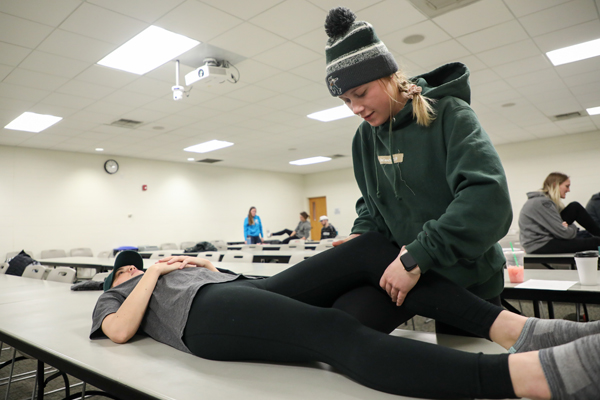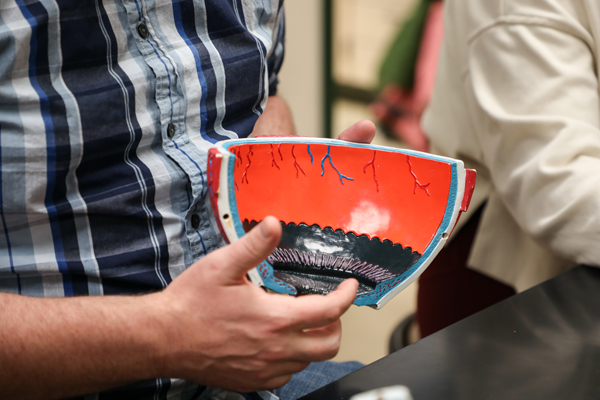
Radiologic Technology, A.A.S.
Radiologic technologists are medical professionals with a primary responsibility to create images of patient’s bodies using medical equipment, helping doctors diagnose and treat diseases and injuries – all while promoting radiation safety and providing quality patient care. Students in this program learn to master the required technology as a radiographer and become vital members of the patient care team.
After successful completion of the requirements for the associates degree are met, the student must sit for the national certification exam administered through The American Registry of Radiologic Technologists, to become a Registered Technologist RT (R), before entering the workforce.
Why Study Radiologic Technology at Highlands College of Montana Tech?
With time spent in both clinical and classroom settings, students in this program experience hands-on, real-life experiences; working with the latest equipment and technology; preparing them to earn ARRT certification and registration in radiography, and enter the workforce as a registered radiologic technologist
Patient-Focused Lab Experience
Highlands on-site radiography lab provides a functional x-ray room; allowing hands-on practice in a lab setting before applying the skills learned in the clinical setting.
Learn by Doing
Clinical hours are spent immersed in the profession and working with registered technologists putting the knowledge learned in the classroom into action. You will ultimately complete over 1,200 clinical hours at one of our affiliated clinical facilities in the region.
Admission Requirements
Admission to Highlands College does not guarantee acceptance into the Radiologic Technology Program. Acceptance occurs through a formal and competitive selection process once program prerequisites are complete. Each spring if you have completed or are enrolled in all program prerequisite courses, you may submit an application to the program. A limited number of students are admitted each year, due to limited clinical space.
Job Shadow Verification
Program applicants must provide proof of a job shadow experience with a registered technologist.
Additional Admission Requirements
In addition to successful completion of prerequisite courses and job shadow hours, program applicants must provide the following with their program application:
- CPR certification – must be Basic Life Support – BLS from the American Heart Association or The American Red Cross. The CPR card must be current, and maintained throughout the program.
- Vaccinations: 3-part Hepatitis B series or positive titer; 2 MMR, proof of varicella vaccination/history of chicken pox or positive titer
- Current clear TB test
- Letter of recommendation
- An essay
- Those accepted must submit results of a clear background check at their expense before clinical hours commence
Some clinical sites may additionally require before site admittance the following – (these are determined and requested once acceptance to the program and clinical site assignments have been made)
- COVID-19 vaccinations (or approved medical or religious exemption on file with disability services)
- Clear drug screening
- Current season flu vaccination
- 2-part TB screening
Certification - An Important Outcome
The Radiologic Technology program prepares students to meet the highest standards necessary to succeed in the healthcare industry. After successful completion of the requirements for the associates degree are met, the student must sit for the national certification exam administered through The American Registry of Radiologic Technologists, to become a Registered Technologist RT (R), before entering the workforce. Montana Tech has determined that the Radiologic Technology program meets the educational requirements necessary for the student to seek licensure/certification in the state of Montana. Refer to our licensure page for more information and a determination about requirements for states outside Montana.
For ARRT registry examination on the first try, 2019 & 2020
A smart investment
With diverse healthcare experience
Students interested in completing their clinical hours through the Miles City satellite program are a separate applicant pool, submitting a unique program application – posted here each February. Accepted students have weekly, in-person labs held in Miles City, with all other coursework online or via zoom. Clinical hours are completed at hospitals in the region (Miles City, Glendive or Sidney). Satellite students must complete the same prerequisites (or accepted transfer courses) to be eligible to apply for the program; prerequisites can be taken through Miles Community College and online through Montana Tech- contact the radiologic technology advisor for further information.
Do you live in or near Montana's Electric City? Students interested in completing their clinical hours in Great Falls will fill out the same application as Butte area students, indicating on their application that Great Falls is their preference or they will consider it if offered. Great Falls area students attend Great Falls Clinic Hospital for clinical hours; in-person weekly labs are held in Great Falls, with all other coursework online or via zoom. Students must complete the same prerequisites (or accepted transfer courses) to be eligible for clinicals in Great Falls. Contact the radiologic technology advisor for further information.
What Kinds of Jobs Do Radiologic Technologists Get?
A career in radiologic technology can lead in many directions, and there is strong demand for work across the country. Work settings after graduation can vary widely from hospitals, to clinics, physician offices, mobile units, education, management, research, public health, and sales or service of radiographic equipment. There also are many opportunities after becoming a registered technologist to specialize and gain certification in additional radiology modalities, including: MRI, computed tomography (CT), radiation therapy, mammography, nuclear medicine, interventional cardiac or vascular radiography, and sonography.
Projected through 2031
Number of projected annual job openings through 3031
Explore Classes in Radiologic Technology
Our comprehensive curriculum in radiologic technology includes important studies in Anatomy & Physiology, Radiographic Procedures, Radiation Safety, Radiographic Image Production, Radiologic Sciences – Physics and Biology, Patient Care and Healthcare Ethics & Regulations.
Meet faculty, explore programs, and more.
Get a semester-by-semester degree guide.
We're proud of our strong career outcomes.

Earn your Bachelor of Science in Nursing degree from our award winning School of Nursing.

Gain a fundamental background in health, human performance and disease prevention.

Launch a career in medicine, dentistry, occupational or physical therapy and more.
We can answer your questions and help you get started.
Instructor
tharp@mtech.edu
406-496-3759